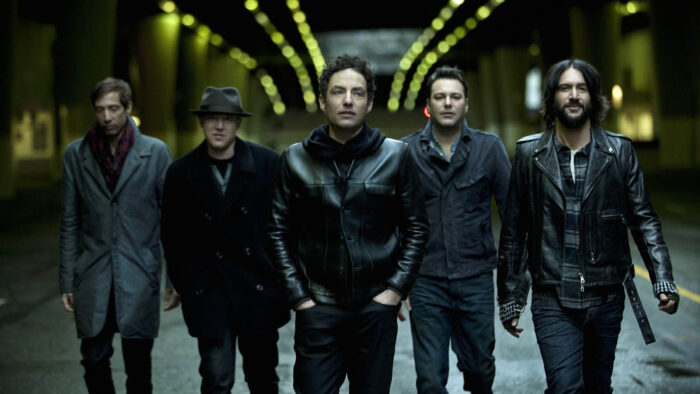Interview: Jakob Dylan Talks About Exit Wounds & Making Music
Jakob Dylan and his band, The Wallflowers, have just released their first album in nine years. It’s called Exit Wounds. We got Jakob on the line to talk about the record, what goes into his songwriting and his film project, Echo in the Canyon.
You can listen to the interview or read a transcript here.
MD: I’m curious because you’ve been doing this for 30 years now and times have changed. Putting out a record and doing all the promo and all that. Is it similar to the way it has been, or have things changed? Especially in the States.
JD: Oh, I think it’s evolved a bit. I think the questions are more interesting and I have a little more information to share. And certainly, when you have a record, people responding well to the conversation is always better.
MD: That’s a good thing. I’ve been listening to the record and loving it. I went down to my pub last night and told the guy to put it on there and they loved it. So, it fit right in. It wasn’t exactly a dive bar, but it’s the closest I could find. laughs…
So, I guess the first, obvious question is, why did you decide to make this record at this time? It’s been a while since a Wallflowers album has made itself known. What was the process like?
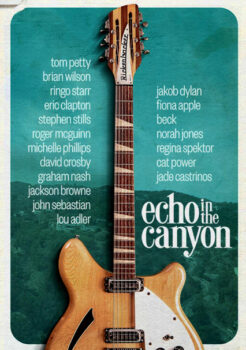 JD: Well, the simple answer is I don’t keep track of time. My main focus is I want to make sure I can tour every year. That’s what I spend most of my time doing. And then I made the movie Echo in the Canyon and I started collecting songs and by the time I got back in the studio it became clear to me that it had been a long time. But really, it wasn’t intentional. I guess you could say I just wasn’t paying attention to whether I was making records or not. I’ve made a lot of records and you know; I think I’m comfortably at a place where I don’t feel the pressure to make records when I’m not inspired. I don’t think anyone wants to hear those records from anybody. So, you’ve to wait for inspiration.
JD: Well, the simple answer is I don’t keep track of time. My main focus is I want to make sure I can tour every year. That’s what I spend most of my time doing. And then I made the movie Echo in the Canyon and I started collecting songs and by the time I got back in the studio it became clear to me that it had been a long time. But really, it wasn’t intentional. I guess you could say I just wasn’t paying attention to whether I was making records or not. I’ve made a lot of records and you know; I think I’m comfortably at a place where I don’t feel the pressure to make records when I’m not inspired. I don’t think anyone wants to hear those records from anybody. So, you’ve to wait for inspiration.
MD: From what I understand you got that from doing that Echo in the Canyon thing, particularly from talking about Tom Petty.
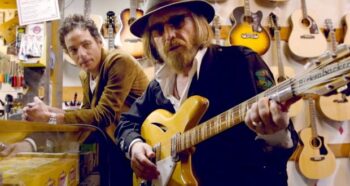 JD: Oh yeah! All those guys we got to talk to. They were all inspiring. There was a lot to be learned from that. I’m brand-new and those people were cherished before me and they’ve really were at the forefront of these careers that I’m looking for. They had a lot to share. And there’s no time that’s more innocent or more simple than any other time, but I am envious of them doing theirs at a time when things were so young and new and everybody’s influences were still really good and there was so much talent packed into one groove.
JD: Oh yeah! All those guys we got to talk to. They were all inspiring. There was a lot to be learned from that. I’m brand-new and those people were cherished before me and they’ve really were at the forefront of these careers that I’m looking for. They had a lot to share. And there’s no time that’s more innocent or more simple than any other time, but I am envious of them doing theirs at a time when things were so young and new and everybody’s influences were still really good and there was so much talent packed into one groove.
I also kind of like the feeling that none of those people really knew that they would have careers. It was so young, they thought they’d have fun for a couple of years, but would have to get a job. They are very inspiring people. It reminded me what I already knew I should know. Those songs were so good and I get a chance to sing them, interpret them – it reminded me that I don’t want to show up at a studio without my songs fully formed. You can do that and you get mixed results from that, but one thing that was consistent with all the material we sing in that movie, it is great songs. So, I was just reminded of that – I already knew that, but…. good to be reminded.
MD: I’m sure you did! It’s all about the songs. So, the songs that comprise Exit Wounds, can you tell me in general terms where they came from and when they were created?
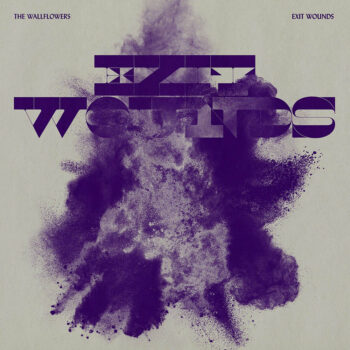 JD: Well the bulk of them were created here in Los Angeles, before the pandemic. Before that the world had already changed over here, anyhow. Our world, the United States. As I’m sure you’re well aware of the mayhem that we lived through.
JD: Well the bulk of them were created here in Los Angeles, before the pandemic. Before that the world had already changed over here, anyhow. Our world, the United States. As I’m sure you’re well aware of the mayhem that we lived through.
So, if you’re a songwriter, there’s a lot of good material, so no complaining that it’s all nice and easy and there’s nothing to write about. That being said, I wouldn’t write about things that are too topical because I want my songs to be timeless. And I think that any situation you are living through – you can take the human qualities of what you’re going through, you can describe those without talking about current events or naming names. That’s not interesting to me. But the feeling that those things create, that’s good stuff for songwriters.
MD: Right. Did you find – I’m an American myself as you can probably tell from my accent, but I’ve been in New Zealand for a long time. Still, I follow everything. Did you feel you have to walk a thin line when you address anything that could be perceived as political or taking one side or the other?
JD: If you look through my records, if you read anything about me, I think you could probably figure out where I sit.
MD: Yeah, I get that.
JD: I just don’t find it overly interesting to sing about those things. Maybe there’s another way to vent those things. But that’s not where I go to for my music. And that’s not my strength. Phil Ochs was tremendous at doing that. He devoted most of his career doing that. I write more about the human condition, how these things affect a human being. I don’t really write about the situation specifically one way or another. I just kinda lay things out there. More from a perspective of how it makes someone like myself feel – living through these times.
MD: Well, the opening track Maybe Your Heart’s Not in It No More. It can be looked at as one thing – being very personal thing about a relationship breaking down, but you can also look at it in a bigger picture that’s political and nationalistic. Is that kind of what you’re aiming for with that.
JD: Unh uh. Well, it’s both. I mean, you can use it whichever way you want. I’m someone who, when I listen to music and almost always, I’m looking for a double meaning or entendre or something. I don’t ever feel like whatever the songwriter is telling is exactly what they want me to hear. So, if you want to talk about these things, you’ve got to house it in something. You’ve got to have some framework. And a lot of times that’s going to appear like a relationship, but that other person, and it doesn’t necessarily mean the opposite sex or the same sex. It might be a building, it might be the year, the time, it might be the climate. It could be the planet. It’s a relationship with something or somebody else, but I would never be so naive to assume that anybody singing that particular song is speaking about a personal relationship to a person.
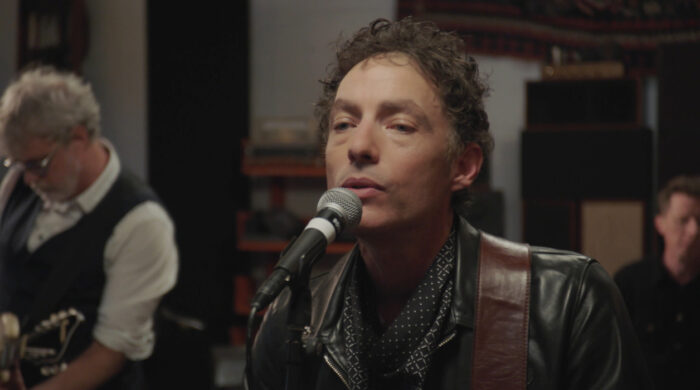
MD: Have you always looked at your song writing from that point of view, or has it evolved over the last 30 years?
JD: No, I think that’s the way I’ve always done it. I think I’ve got a better grip on it, but that’s always been my instinct. It’s like they say in Hollywood – how many scripts are there in Hollywood? Seven? Really. Songs aren’t a whole lot different. You’re always sort of dancing around the same number of themes and it’s up to you as an artist to figure out how you want to couch them. And who your listeners are – who’s gonna pick up on what? But it’s always been the area that I work in.
MD: Right. You’ve got a quote-unquote fresh cast of musicians that you’re working with in The Wallflowers these days and I was hoping you might fill us in on who some of those folks are playing along with you.
JD: It’s in the bio specifically. But it’s just guys I know from around here and Butch Walker. He plays with these guys and I’ve played with them all many times, including Butch. But it’s a rotating cast. It always has been. I think people were confused about that because I never really made it clear. The Wallflowers have always been my group. And there hasn’t been a line-up that made two records ever. So, now there’s nobody from any line-up currently. But it’s just been this thing rolling down the road, people getting on board, people getting off all the time. That’s just how I conceived it.
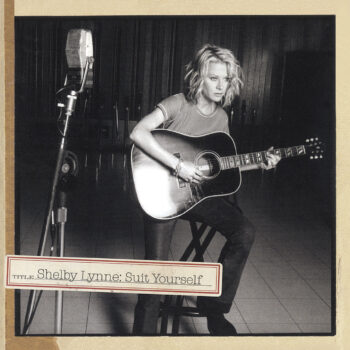 MD: Cool. Yet one person whose got on board is Shelby Lynne. She appears on several tracks, including a duet you do on Darlin’ Hold On. So, what drew you to working with her? There’s obviously a lot of folks you could be working with.
MD: Cool. Yet one person whose got on board is Shelby Lynne. She appears on several tracks, including a duet you do on Darlin’ Hold On. So, what drew you to working with her? There’s obviously a lot of folks you could be working with.
JD: Yeah. That was very organic. I went to New West Records with a list of people I wanted to collaborate with and was one of them people. But when it happened actually, I liked the idea, and we finished that song, Darlin’ Hold On, and Butch and I discussed that woman singing with me. Val McCallum was playing guitar. He plays with her sometimes. So, I just asked him to get in touch with her and see if she’d be interested in coming down. We sent her our song, Darlin Hold On and she responded positively. When she came down, she’s so good that she finished in about fifteen minutes. So, I figure if she’s comfortable, we’ll keep throwing songs at her. So, she became a character and another member of the group, truly on the record.
MD: Cool. And do you see yourself working with her again or maybe doing some live things with her?
JD: I would love to. I hope she knows that. She does. She’s tremendous as a person and an artist. She’s somebody that – there’s certain people you put in a room to make everything better. She’s one of those. I don’t mean just her voice – but her presence and what she emanates. It’s inspiring and makes you want to do and be better. And that’s not very common. I recognise it and she’s got quite a force to her which made me want to do this well.
MD: I Hear the Ocean, I kind of hear The Band there, particularly Garth Hudson. And I was wondering if there’s a touchstone for you as well.
JD: Oh, The Band is one of my favourites. Are you kidding? I put them up there when people talk about the Giants of rock & roll. I put them there with The Beatles and The Rolling Stones, Led Zeppelin. The Band and AC/DC, The Clash. That’s my list right there.
MD: You have a keyboard player, and like you said, I kind of heard Garth Hudson throughout the thing and Maybe Richard Manuel as well, so are you thinking of those things when you are in the studio making that? Or is it just kind of an organic thing.
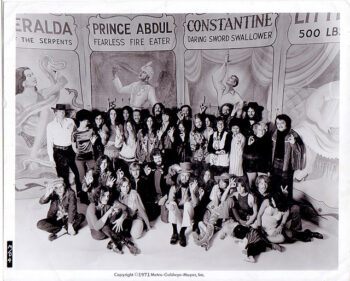
JD: Well, it’s organic, but that’s my line-up. That’s my outlook. When I first put this group together, it was… it was never going to be a guitar rock band. I mean, it’s too limiting to me. My touchstones were Mad Dogs & Englishmen and Leon Russell and I thought… you could do anything you wanted with that line-up – guitar, bass, drums and keyboards. Most bands that don’t have a keyboard player usually hire one to be on their records anyhow. It’s a template that’s been used a lot and it just seems like, if you’re going to get in the business of rock & roll, you should have every weapon available. And keyboards are a great part of that. Not just organ and piano. There’s all kinds, from clavinets to synthesisers. It’s all fair game to me if it sounds good.
MD: Right. So, what was the general vibe like in the studio when you were making the record. Cos, I assume you were making it in troubled times, politically and socially and whatever. Were you kind of isolated in the studio and making it?
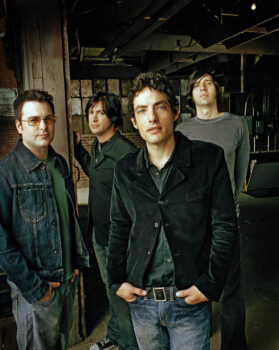 JD: Well, yeah. But it was oddly joyful to tell you the truth. We all… well making records isn’t always joyful and yeah… it was very tentative, very upsetting what was happening. But once we got on the floor and started playing music it was strictly joyful. And it was a relief. And I guess we did spend a week squirrelled off into a room somewhere and got to play music for six or seven hours a day and it was a release.
JD: Well, yeah. But it was oddly joyful to tell you the truth. We all… well making records isn’t always joyful and yeah… it was very tentative, very upsetting what was happening. But once we got on the floor and started playing music it was strictly joyful. And it was a relief. And I guess we did spend a week squirrelled off into a room somewhere and got to play music for six or seven hours a day and it was a release.
MD: Well I guess some of that joy especially comes across in the track before the final track, Who’s That Man Walking Around My Garden? It’s a real rocker. But even in that it’s got a line that says, Next hole you dig is going to be your grave… So…
JD: Well, I’ve never been accused of being short on drama in my songs, so that’s okay.
MD: Then the album does close out with a song called. The Daylight Between Us. When you were putting the album together are you thinking about how one song relates to the other when somebody’s listening to it as a whole?
JD: Oh always. That’s the era that I come from – LPs. I don’t hold a torch for sound quality. I know I like more, but yeah, just let me hear the song. But I do conceive my writing, when I say with LPs in mind… When you’re writing singles, which is what people do when they’re streaming songs, you’ve just got the one stand alone. It’ has nothing before or after it. So, it just lives on its own. But when you make records, you have these songs that – you know, you have this parachute in your closet that you need to unpack.
When you write records as LPs, songs benefit one another. You might use a song on a record because it changes the entire groove or tempo of the entire record. It clears the palate from the one before and the one after it. You have these strategic moments. And you have vignettes. So, you can look at it that way. I look at the songs like vignettes. On their own, it’s kind of like a movie, you know. They’re scenes. And at the end they add up to something that existed for a short amount of time. They take you from point A to point B. But isolated, if you take them apart, they might not sound like they make a whole lot of sense outside of one another. But that’s how I listened to records when I was growing up and that’s just ingrained in my brain how to do it. It’s a much more enjoyable, and better, effort. I’d rather do that than have every song have to be the best song. that’s not how it works. I don’t think you can do that.
MD: Yeah, yeah. It’s interesting – I talk to a lot of musicians these days – some of them very young and some of them very old. And we’re getting a mix of people thinking in terms of the whole record and then one song at a time is where a lot of the youngsters are coming up with. Do you think it’s going to have a long-term effect in terms of people thinking of just one song being streamed on its own? Are we going to have classic albums again?
JD: It already has had a lasting effect. And I don’t know that it matters really. It’s just it the way I do it because that how I know how to do it. I don’t slight kids or younger people for doing it the way they do it. I don’t want to sound like the old guy kicking kids off my lawn. That just not what I do. They know what they’re doing. When you ask them about LPs, they might say that’s kind of cool, but who cares? What’s the difference anyway? You just do what you can do and that all you can do.
MD: Yeah. So, what are you going to be doing next? You’ve been very busy appearing on TV shows. Was there a tour that was postponed? I’m trying to remember what the status of that is about now.
JD: Yeah, we had a tour last year that got postponed and this summer it got postponed again. I don’t have… that was a long tour. I don’t have any say in that. But I did manage to, with the limited amount of space out there for bands touring, we did manage to find a couple of runs though. A week here and a week there, so we are going to get out and play, but it isn’t going to be the full-length tour.
MD: Have you been to New Zealand?
JD: No, I have not.
MD: Well, come on down! We’d love to have you!
JD: Yeah man, I want to come.
MD: We have a very strong Americana scene with our own homegrown people here as well, so there’s a lot to like.
JD: I want to get there.
MD: All right. Well. thank you for taking time to talk to me. It’s been a thrill.
JD: I appreciate it too. And I hope to see you down the road somewhere.
- New Music Friday: 13th Floor New Album Picks: April 26, 2024 - April 26, 2024
- Psycho Gab Perform Gabben at The 13th Floor: Singles Session - April 26, 2024
- Anna Coddington – Kātuarehe: 13th Floor New Song Of The Day - April 26, 2024

